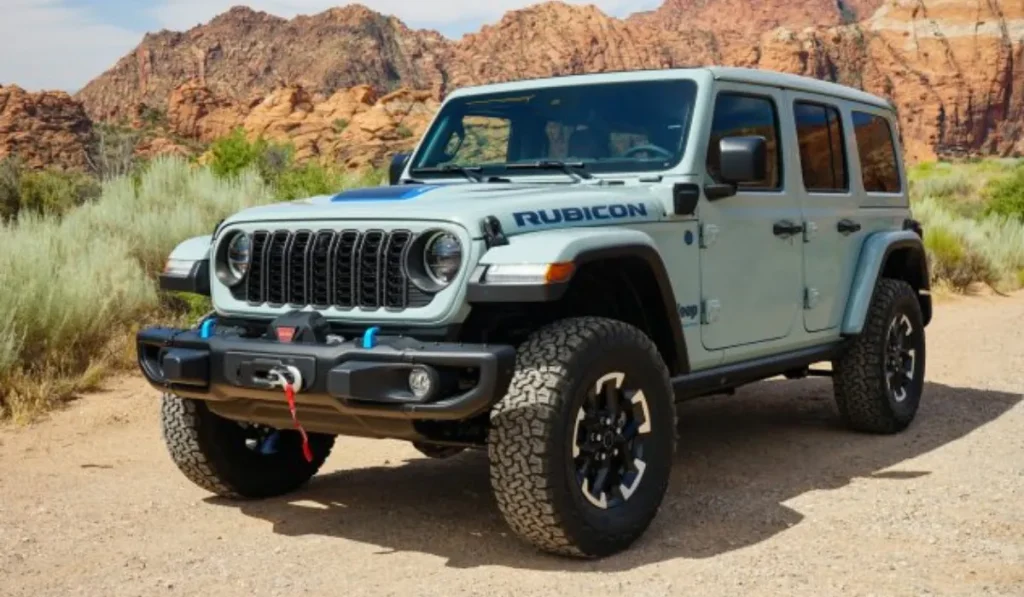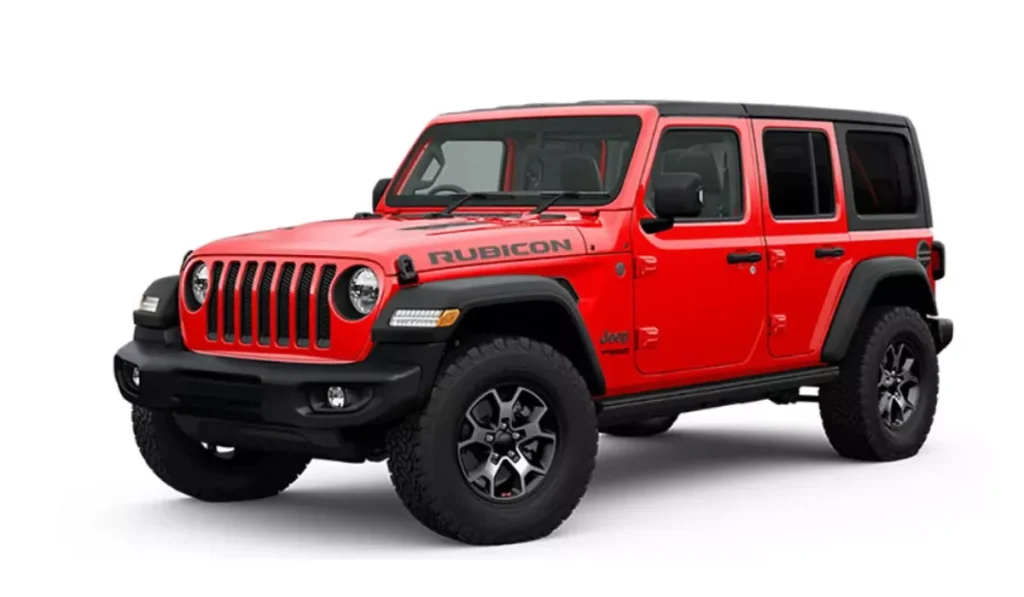A Jeep Rubicon weighs between 4,000 to 5,000 pounds, depending on the model year and configuration. The Rubicon, a popular Jeep Wrangler trim level, offers a rugged build designed for off-road adventures.
Its robust construction and advanced four-wheel-drive system contribute to a heavier curb weight compared to base models.
With the perfect blend of durability and style, the Jeep Rubicon stands out in the Jeep lineup.
Car enthusiasts and adventure seekers often choose the Rubicon for its superior off-roading capabilities, paired with Jeep’s iconic design.
Its weight is a testament to the solid materials and features packed into every vehicle to ensure safety, performance, and unmatched off-road experience.
Whether traversing rocky terrain or cruising city streets, the Rubicon’s weight plays a pivotal role in its stability and handling.
The Jeep Rubicon: An Introduction
The Jeep Rubicon, a powerhouse on and off the road, stands as a testament to rugged durability.
Known for its blend of comfort and performance, it’s the go-to choice for adventurers. Understanding its weight is crucial for off-roading enthusiasts and daily drivers alike. The Rubicon’s build affects its agility, fuel economy, and capability to conquer challenging terrains.
Iconic Design And Utility
The Jeep Rubicon emanates an iconic design that is both timeless and functional. Its sturdy frame and muscular body are not just for show; they enhance its off-road prowess.
Below are key design elements that contribute to its utility:
- High ground clearance for tough terrains
- Rugged 17-inch wheels for superior grip
- Heavy-duty axles and rock rails for protection
Key Features Of The Rubicon Model
The Jeep Rubicon is packed with features tailored for off-road superiority. These features contribute to its overall weight and functionality:
| Feature | Description |
|---|---|
| 4×4 System | Rock-Trac® provides more control and torque |
| Locking Differentials | Lock power for ultimate traction |
| Electronic Sway Bar Disconnect | Allows wheels to drop for better off-road handling |
Weight Specs Of The Jeep Rubicon

When you’re exploring the great outdoors, the Jeep Rubicon is a popular choice. This off-road warrior’s weight plays a crucial role in its performance and handling.
From Factory To Road: Understanding Weight
The Jeep Rubicon has a weight that provides stability and durability.
Manufacturing weight includes only the vehicle with its standard equipment.
What you add later can change the weight. Think about extra gear like winches and oversized tires.
Trim Variations And Their Impact On Weight
The different trims of the Jeep Rubicon come with varying features that affect weight. Here are some key points:
- Base trims are lighter because of standard equipment.
- Upgraded trims have add-ons like leather seats and advanced tech, increasing weight.
- Special editions may have unique parts that affect the weight too.
Understanding these differences is vital for anyone keen on off-road capabilities and vehicle performance.
| Trim | Factory Weight | With Add-ons |
|---|---|---|
| Base Rubicon | 4,500 lbs | 4,800 lbs |
| Rubicon X | 4,600 lbs | 4,900 lbs |
| Rubicon Hard Rock | 4,750 lbs | 5,000 lbs |
Factors Affecting The Weight Of A Jeep Rubicon
Understanding what makes a Jeep Rubicon tick includes looking at its weight. The Rubicon’s weight changes for different reasons. Let’s explore these factors.
Engine Options And Drivetrain Configurations
Two big factors that change a Jeep Rubicon’s weight are engines and drivetrains. Each option adds different weights to the vehicle. Here’s a quick look at how they vary:
- Four-cylinder engines are lighter than V6 ones. Rubicons with these engines usually weigh less.
- V6 engines offer more power. But, they also add more weight to the vehicle.
- Two-wheel drive systems are simpler and lighter. This choice takes a bit off the Rubicon’s weight.
- Four-wheel drive configurations provide better off-road capabilities. They come with extra components, hence more weight.
Optional Extras And Aftermarket Modifications
The weight of a Jeep Rubicon isn’t just what you get from the factory. Many owners choose extras and make modifications. These changes can add to the weight:
| Optional Extras | Aftermarket Add-ons |
|---|---|
|
|
Each add-on, like a chunky tire or a heavy-duty winch, brings extra pounds. Customizing your Jeep means considering these weight changes.
Comparing The Rubicon To Other Jeep Models

The Jeep Rubicon stands out with its off-road readiness and robust stature.
It’s a beloved variant of the iconic Jeep Wrangler, revered for its capability on untamed terrain.
Drivers often juxtapose the Rubicon’s specifications with other models in the Jeep lineup.
Here, we delve into weight variations and explore how these numbers play into overall performance.
Weight Differences Within The Jeep Family
The Jeep Rubicon’s heft is a topic of much discussion among Jeep aficionados.
Different models carry varying weights due to their distinct design and features.
The Rubicon, tailored for rugged landscapes, typically tips the scales with additional weight compared to its siblings.
Here’s a glance at how the Jeep family stacks up:
| Jeep Model | Approximate Weight |
|---|---|
| Jeep Rubicon | 4,439 – 4,862 lbs |
| Jeep Wrangler Sport | 3,948 – 4,201 lbs |
| Jeep Grand Cherokee | 4,513 – 5,356 lbs |
| Jeep Renegade | 3,159 – 3,527 lbs |
Performance And Mobility: Weight Considerations
Weight can be paramount in assessing a vehicle’s agility and efficiency.
The Rubicon, with its additional mass, boasts superior axle strength and more robust underbody protection.
- Heavier weight impacts fuel economy.
- Extra pounds support durability against obstacles.
- Lighter vehicles may offer better acceleration and better fuel efficiency.
Off-road enthusiasts prefer the Rubicon for its ability to endure rough landscapes without sacrificing precision.
On the flip side, lighter Jeep models can offer a smoother experience on paved roads.
Influence Of Weight On Performance And Off-roading
The Jeep Rubicon is a force to be reckoned with, thanks in part to its weight. The scale of this four-wheel warrior influences how it drives and how it conquers off-road challenges.
Its weight factors into various performance dimensions, from gas mileage to its agility on rocky paths.
Impact On Fuel Efficiency
A heavier Jeep Rubicon demands more power to move, affecting fuel consumption. More weight means the engine works harder, which can lead to increased visits to the gas station.
This is vital for adventurers considering range and fuel budget on their journeys.
- Economy: Heavier weight reduces miles per gallon.
- Engine Strain: More mass strains the engine, reducing efficiency.
- Range: Weight impacts the distance a Jeep can cover on a single tank.
Handling And Stability In Rough Terrain
On rugged terrains, a Rubicon’s weight is a double-edged sword. Weight can either anchor the vehicle or make maneuvering more challenging. Let’s explore this concept:
| Aspect | Impact |
|---|---|
| Stability | Increased weight offers better grip in challenging conditions. |
| Maneuverability | Too much weight can hinder swift turns and climbs. |
| Suspension | Weight test the limits of suspension on uneven ground. |
So, a balanced Rubicon that is neither too heavy nor too light tends to perform best off-road.
Maintenance And Care For Heavier Vehicles
Jeep Rubicon owners know that their ride is a robust, heavier SUV built for adventure. Proper maintenance and care are crucial to keep these powerful machines in shape.
A heavy vehicle can affect performance and longevity if not looked after correctly.
Discover the best ways to maintain a heavier vehicle like the Jeep Rubicon and understand how its weight impacts its health over time.
Best Practices For Heavier Suvs
- Regularly check tire pressure: Heavier loads cause more wear on tires.
- Stay on top of oil changes: High-quality oil ensures a smooth-running engine.
- Brake system maintenance: Heaver vehicles work brakes harder, needing frequent checks.
- Balance and alignment checks: Proper alignment prevents uneven tire wear.
Long-term Impact Of Weight On Vehicle Health
Continual stress from a vehicle’s heft can bring long-term challenges. Regular inspections mitigate potential issues before they worsen. Here’s how weight influences your Rubicon’s health:
| Vehicle Component | Impact of Weight |
|---|---|
| Suspension | Faster wear and tear |
| Brakes | Increased brake pad and rotor degradation |
| Engine and Transmission | Higher strain leading to more frequent maintenance |
| Fuel Economy | Heavier vehicles typically consume more fuel |
FAQs About the Weight of a Jeep Rubicon
What Is The Weight Of A Jeep Rubicon?
A Jeep Rubicon typically weighs about 4,439 to 4,862 pounds. This range considers different configurations and model years.
Does A Jeep Rubicon’s Weight Vary By Model?
Yes, the weight varies by model. For example, a 2-door model weighs less than the 4-door version. Each model year may also differ slightly in weight.
How Does Rubicon Weight Impact Fuel Economy?
Heavier weight in a Jeep Rubicon can reduce fuel economy. This is because more energy is needed to move a larger mass, thus consuming more fuel per mile.
Can The Weight Of A Jeep Rubicon Affect Performance?
The weight of a Jeep Rubicon affects its performance, particularly in acceleration and braking. A heavier vehicle typically accelerates slower and requires more distance to stop.
Conclusion
Understanding the weight of the Jeep Rubicon is crucial for both off-road enthusiasts and daily drivers alike.
It impacts fuel efficiency, towing capability, and overall performance. With several models available, the weight varies, so checking the specific details for your version is recommended.
Stay informed and ensure your Rubicon meets all your adventure needs.
Resources:
https://www.jeep.com/wrangler/specs.rubicon.html
https://www.fueleconomy.gov/feg/Find.do?action=sbs&id=46888
